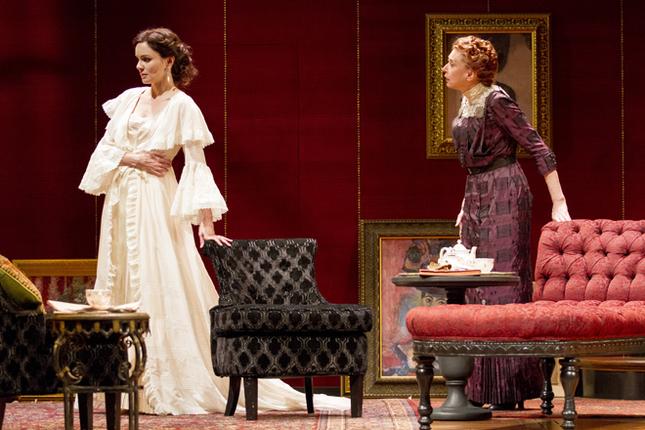There was some head scratching in the seats when the Kennedy Center made Hungarian playwright Ferenc Molnar’s “The Guardsman” its 2013 centerpiece theater production.
The play—written in 1910 by Molnar, who is also known for plays such as “Liliom” which became the basis for Rodgers and Hammerstein’s “Carousel,” had a reputation as something of a warhorse, date and rarely produced, famous mostly as a popular vehicle in the 1920s for the star couple of Alfred Lunt and Lynn Fontanne.
Well, thank God for this war horse, and thank the Kennedy Center for letting us enjoy it in unexpected ways. Thank translator Richard Nelson, who saw the depth and theater magic in the original, and director Gregory Mosher, who staged the newly reconstructed play with flair, panache, and an ear and eye for the world of the theater and those who inhabit it. Especially, thank the actors who may not be all that familiar to theatergoers but who manage the difficult multi-tasking the parts require, by making us see and appreciate not only the nuances in the play, but its heart-breaking dangers.
Of course, “The Guardsman” could have been a door-slamming, laughter-inducing comedic blast—and it remains, still, very funny, but it’s the kind of laughter that’s always loaded with the potential for disaster for the characters and brings an acute tension to the proceedings.
The plot sounds labored—a couple, identified only as the actor and the actress, have reached an impasse in their marriage which the actor fears has gone stale. Now, as we see the two of them bicker and bite at each other in a turn-of-the-century drawing room, a nuanced air of something-about-to-happen has entered their lives. The actor—handsome, excitable, fretful—has imagined that his wife, cool, beautiful, famously restless—may be growing tired of him or falling out of love with him. He confides in their friend, the critic, who has also always been in love with the actress, that he thinks she’s looking for something, perhaps a military type, a “guardsman.” “I’ve seen him,” he tells his friend. “How do you know that?” he’s asked. “Because it’s me,” he replies.
So begins the plot and ploy—the actor will impersonate the guardsman and try to seduce his wife. If he fails, he will “be the happiest of men.” But if not, well: disaster, tragedy, heartbreak, the end of love. But it’s also “the role of my life.” And so he proceeds, popping by in full popinjay regalia at the house (the actor is supposed to be away on a tour), and then pushing forward by visiting the actress at an opera performance (of “Madame Butterfly”) where she’s gone, with her long-time assistant she calls “mother,” who’s always disapproved of the actor.
What ensues, is remarkable, a portrait of two people who have engaged in a passionate high-stakes game where everything matters painfully so on several levels. It’s a kind of war which opens with a big battle and works its way to a kind of irresolute resolution that is perfect for our times. These two are capable of great passions and loves—they’re, after all, gifted and famous actors on the stage when that really meant something. They love themselves, they love each other—maybe—and they love, perhaps more than anything, what they do, which is acting.
Here is Finn Wittrock as the actor—grandly afraid, unsure of what will happen, blustering with big feelings and big gestures. Here is Sarah Wayne Callies, so cool, if not cold, a hot iceberg floating in uncertain waters. Here are the actor and the actress, keenly observed by Shuler as the critic who has a stake in this uncertain game.
This is, of course, what actors do every night—they lie to us by making us believe what they’re doing is real and important every time out, that it’s as fresh as an honest kiss, which is what the actor wants from his wife.
If you’re interested in theater, you should go see “The Guardsman,” and watch what happens. The audience, I noticed, after a quiet beginning, steadily got into the grand deception as if they were at the racetrack with something to win or lose. When the couple kissed at one point, you could hear a voice in the back yell, “Yes!”
I second that emotion.
“The Guardsman” runs at the Eisenhower Theater in the Kennedy Center through June 25.




